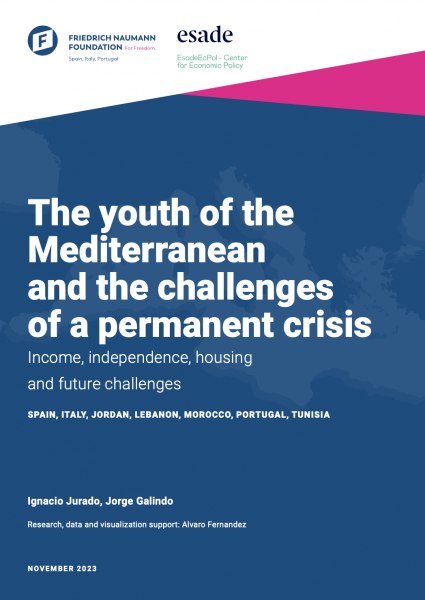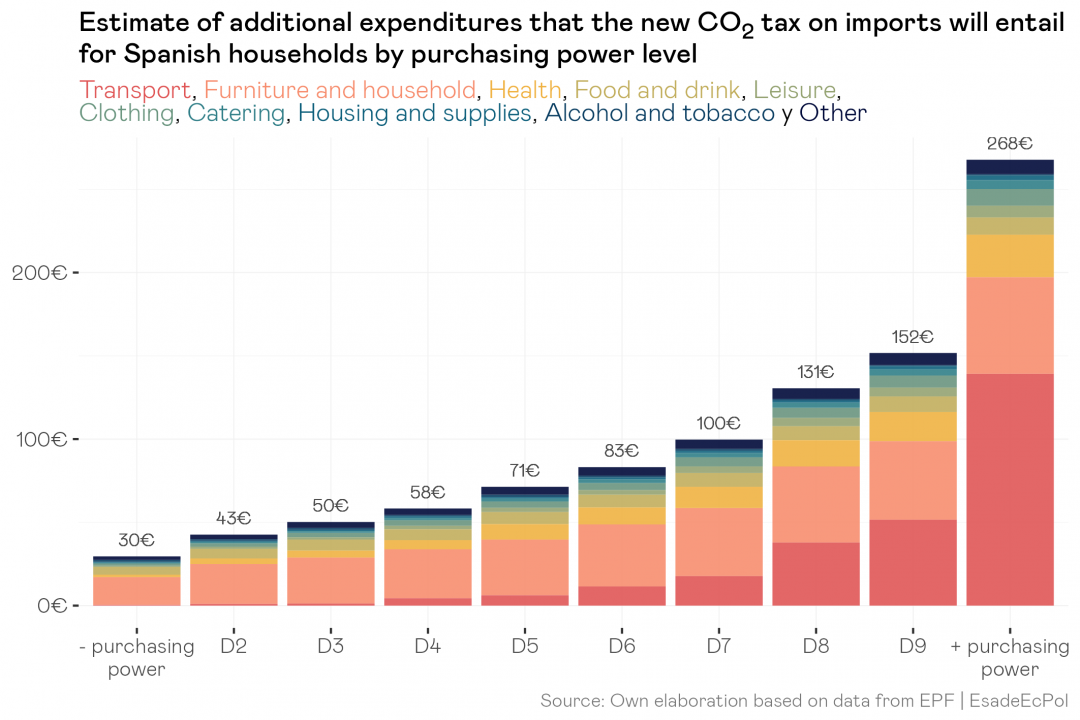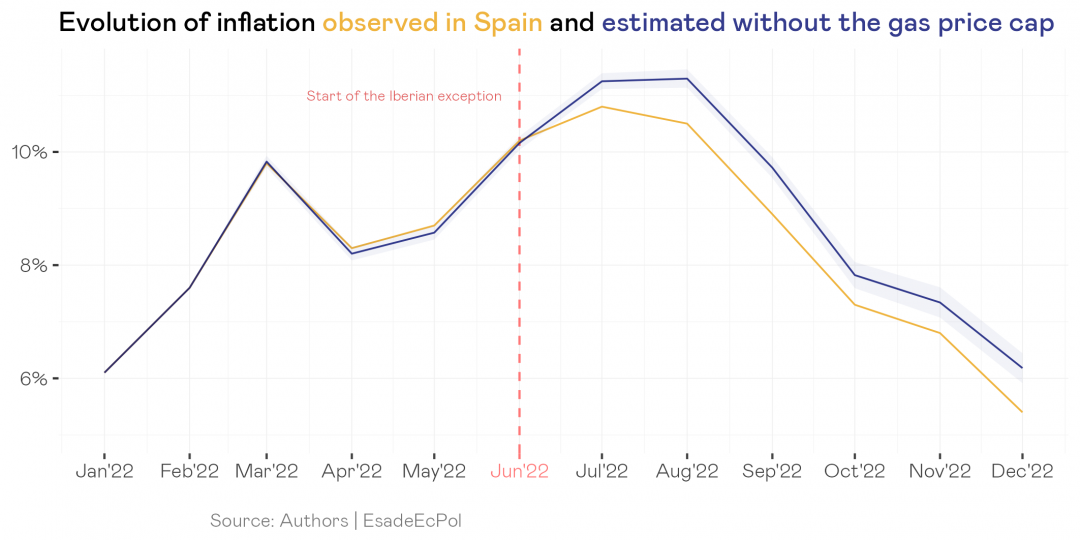
The youth of the Mediterranean and the challenges of a permanent crisis
Ignacio Jurado, Jorge Galindo
14 Nov, 2023
The transition to adulthood for those born between 1980 and 2005 has been marked by multiple economic and social crises, particularly affecting young people in southern Europe and, more generally, in the Mediterranean basin. Our study updates and expands on previous research, incorporating data from a novel, comprehensive and ambitious multi-country survey covering young people (18-34 years) in Spain, Italy, Portugal, Lebanon, Morocco, Tunisia and Jordan.
DIAGNOSIS
The survey reveals a negative present outlook, but with an optimistic view of the future. It is more focused on opportunities than threats when it comes to the major challenges of the future: climate change, digitalization, population aging.
The diagnosis begins with the negative current state perceived by these young people:
- In all the countries analyzed, less than half of young people consider that they can adequately afford their basic expenses: from 42% in Spain to 25% in Lebanon.
- Between 48% (Spain) and 70% (Tunisia) of young people consider that they do not long-term savings capacity.
- In Spain, only 30% of young people consider themselves able to cope with financial emergencies, while 40% face difficulties in saving in the short term.
Inability to move out of their family house is a determining factor:
- Emancipation from the family home is remarkably late even today. In southern European countries, 23% (Portugal), 26.5% (Spain) and 29.5% (Italy) of 30-34 year olds still live with their parents. The figures are even higher in North Africa, for Tunisia (50%) or Morocco (57%).
- In Spain, a majority of young people become independent around the age of 28.
- Lack of income is a factor of high or very high importance for not becoming independent according to 66% of young Spaniards, 62% of Portuguese and 61% of Italians. The figure drops to 40% for Tunisia or Lebanon, and 30% for Morocco.
Within these countries, home ownership is particularly significant because of both family and economic context and constraints:
- Renting is the most frequent form of housing in most countries: around 31% (Spain) and up to 36.5% (Lebanon).
- For the minority who do own housing:
- Nearly all received help from a family member, with an average of around 65% (Spain, Morocco).
- Spain has the highest homebuying age of the countries considered, 25.3 years; Tunisia, the lowest (23.7).
- The lack of savings capacity seems to link a lack of housing independence with the inability to buy a home, especially in European countries: around 6 out of 10 non-independent young people in Spain, Italy or Portugal give this factor a high or very high importance for remaining in the family residence.
Pessimism continues when asked about the future of the country as a whole:
- In a majority of countries, at least 40% of young people anticipate a decline in their country’s future over the next two decades. (48% in Portugal, 47% in Italy, 42% in Spain).
- As for the percentage of young people anticipating progress in their country’s future over the next two decades, in Spain it is 25.2%, 21.8% in Portugal and only 20.7% in Italy.
In contrast, young people’s prospects for their own and their families’ futures are positive:
- The pessimism we reported earlier is lessened when young people of southern Europe project their nearer future. In Spain, 62% believe that their spending power will be good or very good. In Italy it is 56%, and in Portugal 53%. This outlook is slightly to significantly worse in North Africa (Morocco: 46%, Tunisia: 50%) and the Middle East (Jordan: 51%, Lebanon: 39%).
- Similarly, a majority of young people expect their household will be better off in 25 years on each country’s relative wealth scale than it is today.
- Moreover, only a minority of 11% (Spain) to 21% (Lebanon) consider it unlikely or not at all likely that they will be able to buy a home in the next decade, underscoring the decoupling that exists between short and long-term prospects.
Young people’s perspectives on key challenges are rather positive as well:
- As a general rule, these key challenges (automation and digitalization; decarbonization policies; population aging) are more often seen as opportunities than threats by young people in these countries.
- If any of these challenges shows a somewhat higher frequency of threat perception, it is automation and digitalization.
PROPOSALS
Based on this analysis, we offer a series of proposals aimed at meeting these demands, precisely by combining a focus on balanced prosperity and the creation of opportunities, on three fundamental fronts.
Human capital infraestructure
- Expand and improve universities and other post-secondary training centers as a public investment priority.
- Guarantee equitable access to education through reduced fees, income-based scholarships, or a combination of both.
- Foster academic quality and competitive research through university autonomy.
- Maintain continuous, market-informed updating of the academic curriculum.
- Define and consolidate professional training adapted to the needs of the market.
- Optimized and dynamic career guidance, based on data that facilitates skill matching for students/ candidates and companies, with a focus on reducing early school dropouts.
Economic support from the outset
- Affordable minimum benefits for young people in low-income households.
- Notional accounts for young people from households without significant wealth, which grow through joint contributions from them and their employers, and can be used to cover adverse events, home purchases, or the creation of new entrepreneurial projects.
Access to housing
- Investment in public housing: increasing budget and streamlining approvals.
- Encourage the private sector by simplifying licenses and offering incentives, while also focusing on public-private partnerships with clear frameworks for joint projects.


Professor of Political Science at the Carlos III-Juan March Institute of the Carlos III University of Madrid.
View profile


